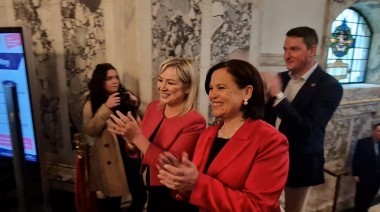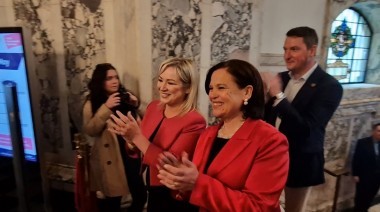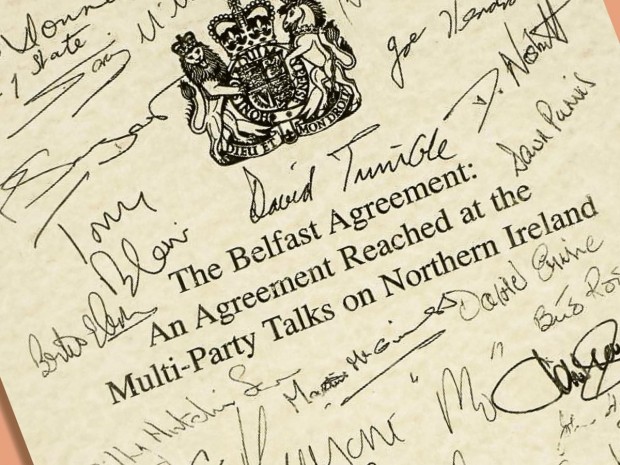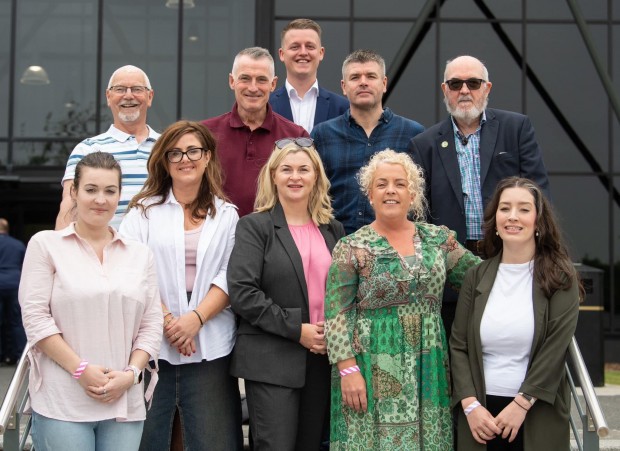8 June 2023
Watershed election underlines need to prepare for a new future

"The future is bright. A new, rights-based, national democracy is the way forward. That prospect is now within touching distance."
It’s now three weeks since the council elections in the north of Ireland. This was another watershed election. Sinn Féin has become the largest party of local government; winning 144 seats and 31% of the vote.
The DUP held its number of seats and is still blocking the restoration of power sharing, but unionism’s overall political and electoral position has been further weakened.
Support for those political parties which are pro-Irish unity is now significantly higher than those parties which support the union with Britain.
The north has changed irreversibly, and that process is set to continue. More elections are scheduled north and south for 2024 and 2025.

- Sinn Féin leadership arrive at Belfast City Hall
The DUP cannot reverse what is happening all over Ireland. The popular ambition for change is what is fuelling the surge in support for Sinn Féin as the largest party on the island.
This would be a sensible moment for the DUP to change its negative political position and to agree to share power properly.
Perhaps the DUP leadership has a plan to do just that, but there’s no evidence publicly or privately to indicate this is likely in the short to mid term.
That’s an absolutely unacceptable situation in the midst of a deepening cost of living emergency, and an endemic crisis in public finances which is further undermining health, education and other services.
Two elections have now occurred in the north since May 2022. The democratic will of the people continues to be defied.
The rest of us should not have to wait for the DUP. The Good Friday Agreement (GFA) and power sharing must not become casualties to its wrecker’s agenda. A dangerous drift is taking hold within the political process.
In these circumstances, the British and Irish governments are obliged to act as co-guarantors of the GFA. That is what is needed at this time.
The GFA is an international treaty, which defined the terms of the peace accord in Ireland. It recognised the contested nature of the northern state arising from partition, and the legacy of institutionalised sectarian inequality and the dominance of a one-party state since 1921.
That is why the Agreement provides for the exercise of self-determination through the mechanism of a unity referendum to be held concurrently in the north and south of Ireland.

The decision to set a date for such a poll should flow from a process of direct engagement and planning between both governments on managing constitutional change in Ireland.
That presupposes an acceptance by both governments on the need for a pragmatic change in policy to plan and prepare for the eventuality of Irish unity.
Neither the current coalition in Dublin or the Tory government in London are minded to do so at this time – even though there is a recognition by officials within both state systems that is an unrealistic attitude.
It is an unsustainable position particularly for the government in Dublin, which has a constitutional responsibility to promote the achievement of Irish unity.
Refusing to accept the need to plan and prepare for a transition to unity makes no sense.
The last two elections in the north, and successive polling north and south, all indicate that the popular debate around Irish unity has a fast-growing momentum.
It is ironic that the original catalyst for the dynamic realignments happening in the north, and for changed relations between Britain and Ireland, began with the election of the Tories to government in 2010. From that point, the British government has negatively disengaged itself from the peace and political process: a clear reflection of how little investment the current generation of Tory politicians have in the peace process or the GFA.
Then came the catastrophe of Brexit and the attempts by both the Tories and DUP to make it as hard as possible.
Brexit, ongoing demographic change, and electoral realignment north and south, have all combined to create a new political and societal landscape.
As a result, and 25 years after the GFA, there is now a powerful demand and ambition for change in the north.
New realities are dawning across society; citizens are making new choices.
That is a clue to understanding the watershed significance of Sinn Féin’s electoral successes in May 2022 and then becoming the largest party of local government. This particular election result is a game changer.
The northern state was structurally engineered through a process of gerrymandering to perpetuate inequality and second-class citizenship. However, the majority of votes cast on 18th May were for new, progressive, positive and inclusive politics.
All of these thoughts occupied my mind during the counting of votes for the Antrim and Newtownabbey Borough Council, which constitutes most of my South Antrim constituency.
I was transported back to 1985 when Henry Cushinan was elected as the sole Sinn Féin councillor to the old Antrim Borough Council. Henry and I first met in 1983 when he was released from the H-Blocks having served six years as a POW – four of them on the blanket protest.
Early in 1985 Henry was selected by the local Sinn Féin cumann to contest the council election in May and I was appointed as election director.
We won the seat. Local history was made. Back then Sinn Féin won 59 northern council seats and took a 11.8% share of the overall vote.
During the 1980s and 1990s Sinn Féin councillors, activists and family members were being regularly assassinated and attacked. South Antrim was a dangerous place.
Sometimes it was better to stay overnight with a friend or relatives to avoid driving home late at night and meeting a UDR/RUC checkpoint – both state forces were directly colluding with unionist death squads in that period.
Back then Henry Cushinan and other party councillors regularly ran the risk of assassination while attending or returning from council meetings. That is how our friend Councillor John Davey was murdered on his own lane in nearby South Derry in February 1989.
The peace process and GFA brought that dark period to an end. A new generation has since grown up untouched by those realities. The north is unrecognisable from the 1980s and 1990s.
Sinn Féin has also grown as a political and electoral force. It has become an engine driving forward progressive, pluralist and people-centred politics.
My mammy used to say that “it’s a long lane which has no turning”.
Her wise words resonated with me as I watched the votes being counted.
Henry Cushinan topped the poll in his electoral ward – 38 years after his first election – and in the same ward. But this time he was joined by another eight Sinn Féin councillors, to become the second largest party group in Antrim and Newtownabbey Council.

- Sinn Féin Antrim & Newtownabbey Council team with Declan Kearney
It was an incredible result, mirroring party successes across the six counties, mighty and emotional. An expanded council team; a majority of them female representatives. Positive, motivated, progressive representatives, committed to working for all.
Last weekend I attended a reenactment of the Battle of Antrim 225 years ago. The event marked the iconic 1798 United Irish Rising led by women and men who took inspiration from the ideas of the American and French revolutions. They laid the foundations of modern Irish Republicanism with the timeless principles of anti-sectarianism, equality, national independence, and the unity of ‘Catholic, Protestant and Dissenter’.
I was really proud to be accompanied by three of our newly elected councillors.
It was another little piece of history being made. More evidence of the tangible change that is happening in plain sight, all around us.
I like to think Henry Joy and Marry Ann McCracken, Jemmy Hope and Roddy McCorley would be proud and pleased.
As for the immediate term, we have much work to do.
A new, pluralist, progressive Ireland is possible, but not inevitable.
The monolith of political unionism is no more. The ability of the DUP and others to permanently veto the process of change has been ended.
That’s why it makes sense for them to get involved in discussions about managing future transitional arrangements. Refusing to talk won’t make the conversation go away.
Workers and families in Ireland, north and south, want a better society for themselves and their families.
They have been failed by partition, and by unionist and gombeen politicians.
We can do better, and we deserve better.
Constitutional change and Irish unity are on the political horizon.
The future is bright. A new, rights-based, national democracy is the way forward.
That prospect is now within touching distance.
So, whether you are ‘Catholic, Protestant or Dissenter’ or none of those, get involved and help make even more change happen.
Follow us on Facebook
An Phoblacht on Twitter
Uncomfortable Conversations

An initiative for dialogue
for reconciliation
— — — — — — —
Contributions from key figures in the churches, academia and wider civic society as well as senior republican figures





